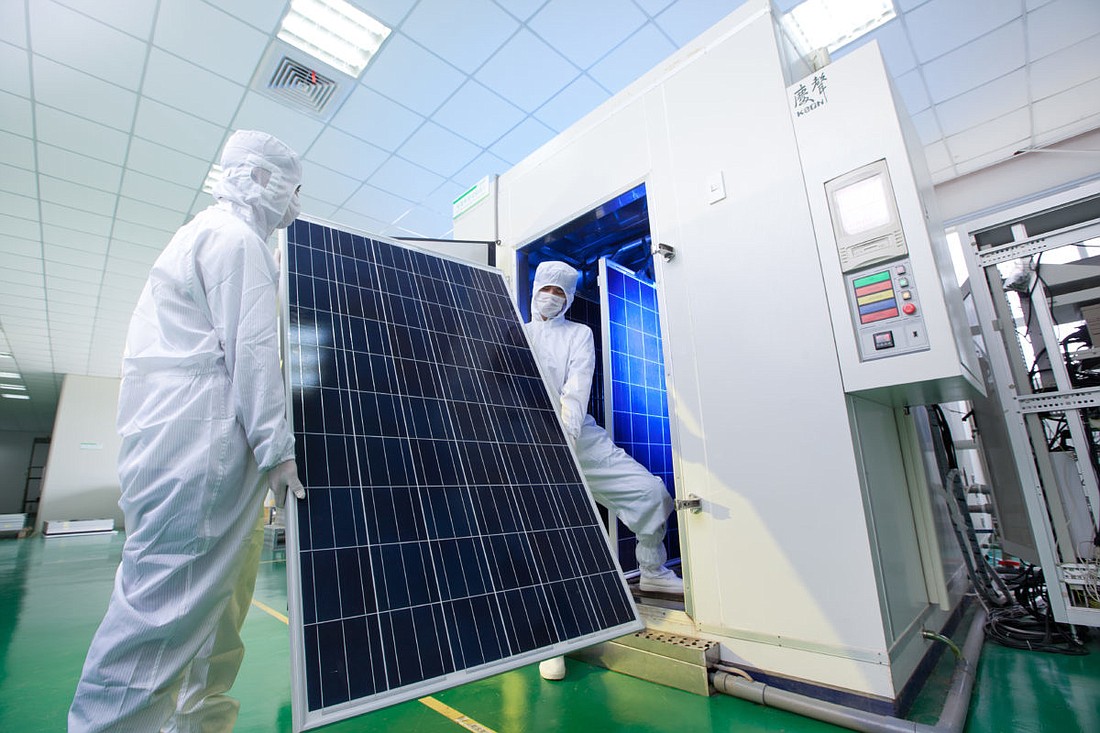
JinkoSolar (U.S) Inc. wants an exclusion from federal tariffs to import certain solar cells from Malaysia to a U.S. headquarters and manufacturing facility it proposes in West Jacksonville.
Through law firm Orrick, Herrington & Sutcliffe LLP, the company made the request March 16 in a filing to the U.S. Trade Representative.
It asked the government to exclude imports of 158.75 mm square P-type monocrystalline photovoltaic cells from the tariffs levied in January by President Donald Trump.
The company, a subsidiary of China-based JinkoSolar Holding Co. Ltd., said in the request it plans to begin operations in Jacksonville by October and sell the panels to U.S. customers.
Any finished modules using the cells will go to utility-sale projects, which require higher power output to maximize the ground coverage ratio, the Orrick letter said.
JinkoSolar Holding Co. said Jan. 29 that JinkoSolar (U.S.) Inc. signed a major master solar module supply agreement with an unidentified U.S. counterparty. That triggered its board to authorize JinkoSolar to finalize plans for the facility.
It is the first Chinese-based solar company to announce plans for a U.S. plant since Trump announced Jan. 22 that the U.S. would impose duties of up to 30 percent on solar equipment made abroad.
The company is negotiating an economic development agreement with the city for $3.4 million in financial incentives.
It also is seeking at least $800,000 in state-backed incentives.
JinkoSolar said in the agreement it plans to invest $50.5 million into a solar-panel assembly and distribution operation at 4660 New World Ave. in AllianceFlorida at Cecil Commerce Center and hire 200 employees by 2019.
The cells referred to in the filing use what’s called passivated emitter rear cell, or PERC, technology and are larger than standard crystalline silicon photovoltaic cells, allowing the company to produce 72-panel modules with higher power output.
The filing said the larger-format PERC cell panels primarily are for use by large utility customers, which the company claims comprise about 66 percent of the U.S solar-panel market.
It said about a quarter of the factory’s production will focus on the larger panels by 2019 and that production could eventually make up 50 percent to 85 percent of its operations.
JinkoSolar claims no U.S. manufacturer is producing the larger-format PERC cells and that the technology leads to more efficient and more powerful panels.
“These more powerful panels will generally be used by utility customers, and will allow them to use fewer panels in an overall system, thereby reducing balance of system costs (associated with racking, inverters, cables etc.) and, as a result, lowering electricity costs,” the letter states.
To justify the need for the exception, Orrick wrote that the production “will produce investment in U.S. manufacturing facilities, increase employment in high-paying manufacturing jobs and lead to the use of advanced manufacturing process in the United States, all major priorities of the Trump administration trade policies.”
In addition, JinkoSolar states the exception would benefit the solar panel industry by making it more competitive and allowing domestic manufacturers to scale their facilities.
According to the Office of the U.S. Trade Representative, companies already receive an exemption for the first 2.5 GW of imported cells for the first four years of the “Safeguard” tariffs.
JinkoSolar (U.S.) Business Development Director Jeff Juger said Friday the entire U.S. market is expected to exceed that limit to serve the U.S. market and the company would prefer the exception be granted sooner rather than later.
JinkoSolar said in January it would provide around 1.75 GW of high-efficient solar modules over a three-year span.
The company states that import restrictions on cells would not result in the U.S cell production becoming available for the merchant market “for years, if ever.”
“Cells made in the United States generally have costs 20 percent greater than cells made in Asia,” it states.
JinkoSolar plans to use JaxPort to import its PERC cells and other products. Juger said the PERC cells are imported from Malaysia.
Shanghai-based JinkoSolar Holding reported $4.07 billion in revenue for 2017.
Through a global network encompassing eight production facilities, 24 sales offices in 23 countries, and 16 subsidiaries, the company employs more than 15,000 people. That makes it the No. 1 manufacturer of solar modules in the world, according to industry website PVTech.org.
It operates a sales office in San Francisco. The Jacksonville plant would be its U.S. headquarters and the first domestic manufacturing operation for the company.
“The United States has an opportunity to develop an industrial-scale panel production sector, with all of the employment and technology leadership benefits that come with the sector,” the filing concludes.
“But this new manufacturing capacity will not emerge without reliable, tariff-free access to the needed solar cells.”
City Council is considering the economic development legislation on a “fast-track” basis, meaning it needs only two readings. Council plans to vote on the measure March 27.